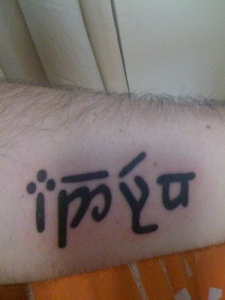When it comes to world building for a fantasy novel, an important step would be the creation of another language. There’s an entire world being presented in a fantasy novel, which means different, races, cultures, climates and geography.
Elves can be an important part of any fantasy world. I love them, and refuse to create a world without them. However, I am not going to simple take Tolkien Elves and drop them into my world. Sure, they may look the same, but they will not act the same or have a similar history. Therefore they shouldn’t have a similar language either.
Photo Andrew Dobrow (Creative Commons License)
I’m a linguistic dilettante, so I can’t resist. I’ve decided that Elvish (Varnya) on my world will be based on a three letter root system, which is of course the basis for the Semitic languages. The language will also be conceptual, and will use prefixes, suffixes, and infixes to create different words while maintaining the conceptual three letter root.
I took the Russian word for “word” – Slovo and created my three letter root SLF (“V” and “F” are very similar). Next, I thought about all of the words that could be associated conceptually.
Letter – word – sentence – paragraph – book – author – library – alphabet – message – scroll – to write – writing implement
Next it’s just a matter of vowels, prefixes, suffixes, and infixes to create all of the necessary words. I’ve also decided that the infixes “la” and “lu” are only for verbs and “doers” of the concept. Therefore, the word for “letter” in Varnya would be Salaf, and “author” would be Salulif.
I know that in fantasy novels, created languages can be either a cause for depth or confusion. It’s a fine line to walk. How do you feel about created languages in fantasy novels? Do they help to immerse you into the fantasy world, or do they cause confusion and distance?



If it is not overdone, I think created languages can be cool. Otherwise, I easily get confused.
LikeLike
Overdone is the key. I’ve been confused at times by using created languages. I’m learning to find the line then walk it.
LikeLike
It looks very artistic. However, any language is a means of communication. So as long as the new language can manage to communicate, I’m fine with artistic liberty.
LikeLike
Thanks Sweety, I appreciate that sentiment. I plan on using it a lot. Just enough to draw a reader into the world.
LikeLike
I like the scheme. Consistency is important. I would change the letters so they aren’t romanized. Create your own characters. I would also make it so the narrator isn’t fluent in the language. Then translations make more sense. The narrator requires a translation, that way we get it. It’ll cut back on confusion for the reader, which were points others brought up. Ernesto, that is ambitious! I tried a language once. Didn’t go well. I’ll still use mechanics for people and places, but I try to avoid the made up words. Good luck in whichever path you take on it!
LikeLike
Not sure if I can do the alphabet and get it loaded up into an ebook. It’s only going to be used in a couple of chapters, but I do want it flow and appear natural.
I’m glad that I’m on the right track with the MC not knowing the language. I’m convinced that you’re a better world builder than I am. Therefore, I like it when you drop by to give your opinion.
LikeLike
That is a massive amount of work! I take my hat of to you. Have a lot of fun with your novel.
LikeLike
If there’s ever a sequel to The First Light, then this work is already done:-)
LikeLike
I’m with Cate – whew! My hat’s off to you. VERY clever.
For me, it depends on how the created language is worked into the context otherwise. In a film, facial expressions and body language convey the meaning regardless (remember Quest for Fire? no words at all, but totally clear what was going on).
However, It would make me crazy to have to “translate” to follow the plot in a novel. That would keep me from total immersion, not help me fit into the world.
If one of the novel’s “English-speaking” characters was a linguist who was also attempting to translate that might be fascinating, however.
My two cents! Probably worth no more than that. (btw, left you a comment to your comment on my blog — THANKS!)
xx,
mgh
(Madelyn Griffith-Haynie – ADDandSoMuchMore dot com)
– ADD Coach Training Field founder; ADD Coaching co-founder –
“It takes a village to educate a world!”
LikeLike
It will be used sparingly and with the main secondary character translating.
LikeLike
I figured on the former, reading the comment thread, but I’m thrilled to hear the latter. I’ll bet it will be GREAT (no pressure 😀 )
I wish I could be the proverbial wall-fly, watching you work it all out — a mind-reading wall-fly!
I’m hoping you’ll give us inside glimpses on your blog. I’m now following.
SO many interesting reads, so little time!
xx,
mgh
xx,
mgh
LikeLike
Thanks Madelyn for your vote of confidence. Hope I can live up to it.
LikeLike